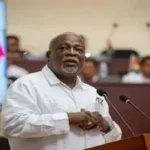There’s a strange silence that follows the sound of a distant explosion. Not in the war zone — but in the living rooms, offices, and cafés where those events are “watched,” not lived.
It’s not the explosion that shocks anymore. It’s the absence of pause. The lack of reaction. We’ve built a world where the deaths of some people don’t interrupt anything. Their tragedy has been made invisible by geography, race, and politics — but mostly, by design.
There are people whose lives are measured by what they threaten, not what they mean. A child killed by a drone strike in a desert village is not grieved the same way as a child lost in a European classroom. One is a headline. The other is a moment of silence. That disparity didn’t come from nature. It was taught.
Media institutions, governments, and even well-meaning citizens have grown fluent in emotional selectivity. Some pain feels relatable. Some pain is packaged as “inevitable.” And some, simply, is left out.
There is no algorithm for whose suffering matters. But there are systems — and cultures — that quietly make those decisions every day.
Until that changes, the world will keep hearing explosions — but never stop long enough to feel what they destroyed.






